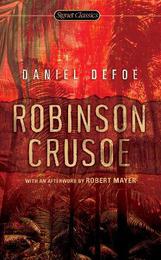
|
Robinson Crusoe
Paperback / softback
Main Details
| Title |
Robinson Crusoe
|
| Authors and Contributors |
By (author) Daniel Defoe
|
| Physical Properties |
| Format:Paperback / softback | | Pages:322 | | Dimensions(mm): Height 172,Width 105 |
|
| Category/Genre | Classic fiction (pre c 1945) |
|---|
| ISBN/Barcode |
9780451530776
|
| Classifications | Dewey:823.5 |
|---|
| Audience | |
|---|
|
Publishing Details |
| Publisher |
Penguin Putnam Inc
|
| Imprint |
Signet Classics
|
| Publication Date |
6 May 2008 |
| Publication Country |
United States
|
Description
Daniel Defoe's classic novel is the vividly realistic account of a solitary castaway's triumph over nature - and of the fears, self-doubt and loneliness that are parts of human nature. For almost three centuries, Robinson Crusoe has remained one of the best known and most read tales in modern literature, a popularity owing as much to the enduring freshness and immediacy of its style as to its widely acknowledged status as the very first English novel.
Author Biography
Daniel Defoe (1660-1731) is the author of Robinson Crusoe, Moll Flanders, and A Journal of the Plague Year. Paul Theroux is the award-winning author of such novels as Picture Palace and The Mosquito Coast as well as numerous bestselling travel books, including The Great Railway Bazaar. Robert Thayer is Professor of British Literature and Director of the Screen Studies Program at Oklahoma State University and the author of History and the Early English Novel- Matters of Fact from Bacon to Defoe.
ReviewsBeyond the end of "Robinson Crusoe" is a new world of fiction. Even though it did not know itself to be a novel, and even though there were books that we might now call novels published before it, "Robinson Crusoe" has made itself into a prototype . . . Perhaps because of all the novels that we have read . . . the novelty of Defoe s fiction is the more striking when we return to it. Here it is, at the beginning of things, with its final word reaching out into the future. from the Introduction by John Mullan" "Beyond the end of "Robinson Crusoe" is a new world of fiction. Even though it did not know itself to be a 'novel, ' and even though there were books that we might now call 'novels' published before it, "Robinson Crusoe" has made itself into a prototype . . . Perhaps because of all the novels that we have read . . . the novelty of Defoe's fiction is the more striking when we return to it. Here it is, at the beginning of things, with its final word reaching out into the future." -from the Introduction by John Mullan
|